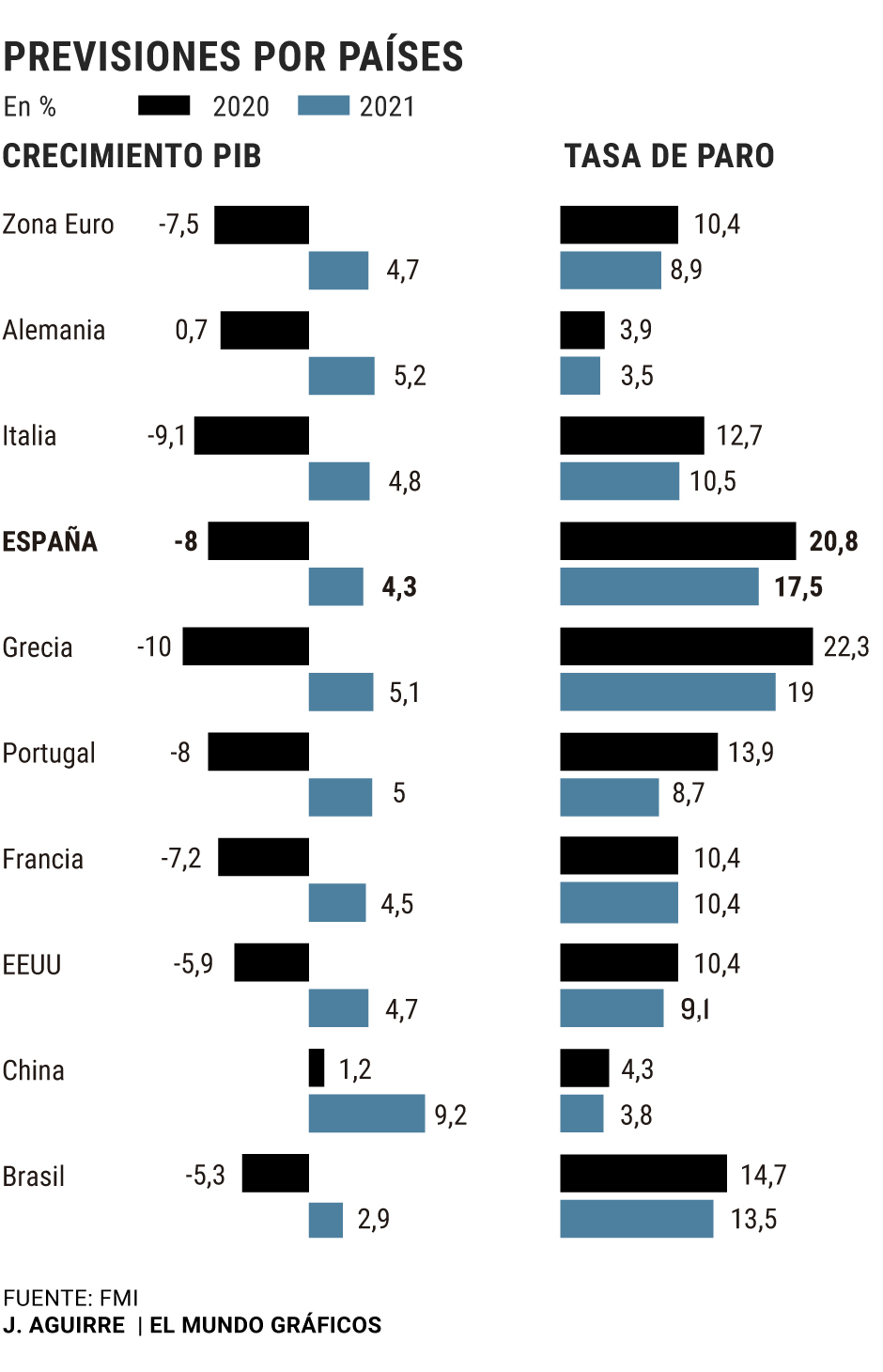The economies of the countries hardest hit by the coronavirus and which have had to adopt the "most drastic containment measures" are going to suffer the most from the crisis. This is revealed by the IMF economic forecasts published yesterday, which show that the two western countries most affected by the pandemic, Italy and Spain, will also be those whose economies fall the most.
In the Spanish case, the Fund foresees a fall in GDP of 8% in 2020, that is to say, one percentage point more than the collapse it experienced in the six years since 2008 -when the crisis of junk mortgages in the US broke out- to 2013 - the year in which Spain grew again in a sustained manner with the end of the euro crisis. In the case of Italy, the drop is 9.1%. In Belgium, which, after Spain, is, along with Italy, the country with the most deaths in relation to the size of its population, 7.5%. France, the fourth country in death toll, will see its economy contract 7.2%, three tenths less than the Netherlands, where the pandemic is also wreaking havoc.
This is the consequence of what the Fund describes as "the great lock" , and which it summarizes in the report when affirming that "as more countries are forced to respond to the pandemic with stricter quarantines such as the views, for example, in China, Italy and Spain, this will necessarily lead to a sharper decline in economic activity due to the closure of workplaces where non-essential activities are carried out, travel restrictions and changes in behavior »of citizens.
This indicates that, the more “bolt-on”, there will not only be more crises but also a slower exit from it or, as many say, in the form of L. After the collapse of the GDP of 8% this year, Spain will only grow 4.3% in 2021 . The more than two million jobs destroyed by the crisis in 2020 will not be offset by the little more than a million created next year. As a consequence, the unemployment rate will go from 14.1% on average in 2019 to 20.8% in 2020 and 17.5% in 2021. It is a clear contrast with countries such as Germany and the United States, which will have a recovery in U or V, that is, much faster.
IMF forecasts also highlight the structural weaknesses of the Spanish economy. One is the persistent inability to create jobs reflected in unemployment. The other, dependence on the tourism sector, which accounts for 13% of national GDP. Practically, all the countries that are tourist powers suffer the crisis in an exaggerated way, even though they have contained deaths at levels much lower than those of Spain. Portugal, for example, will register a fall in GDP of 8%, according to IMF forecasts. Greece, 10%. Croatia, 9%. All of them will have recoveries in L in 2021.
These losses are located in the central scenario foreseen by the Fund, which foresees a fall in world GDP of 3% this year, in what is the greatest crisis in history in peacetime since the Great Depression , which began in 1930 and it did not end until 1939 in Europe and 1941 in the United States. But if the worst-case scenario predicted by the institution is taken, with a longer period of "bolt-closing" of the countries and a second outbreak in 2021, world GDP would fall by 11%.
The institution's recipe is a more active role for governments. As another report presented yesterday by the IMF affirms, «the authorities should encourage banks to negotiate, in a prudent manner, temporary adjustments in the conditions of loans to families and companies that are having problems to service their debts. ».
In fiscal matters, the institution led by Kristalina Georgieva praises "measures of considerable size , timely, temporary and precise aimed at putting a limit on the suspension of payments of companies and families through moratoriums on payments and credit guarantees." As the institution's chief economist, Gita Gopinath, has stated, "This is an external shock, and that requires governments to spend."
According to the criteria of The Trust Project
Know more- GDP
- Spain
- Italy
- IMF
- U.S
- Holland
- Portugal
- Greece
- France
- Europe
- Croatia
- China
- Belgium
- Germany
- Unemployment
EconomyBorders will open to tourism in late July, study finds
InterviewDaniel Lacalle: "At this rate, unemployment will reach 35% and 900,000 Spanish companies will not reach 2021"
Balance of the crisis Are we responding to the challenge with the right weapons?

